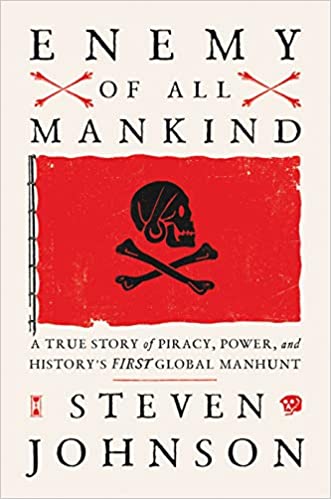You have /5 articles left.
Sign up for a free account or log in.
 Enemy of All Mankind: A True Story of Piracy, Power, and History's First Global Manhunt by Steven Johnson
Enemy of All Mankind: A True Story of Piracy, Power, and History's First Global Manhunt by Steven Johnson
Published in May of 2020.
Can the idea of faculty governance be traced back to self-organizing communities of shipboard pirates?
Doubtful. Almost certainly not. A hard no.
One of the (the very many) things that I learned from this latest Steven Johnson book is egalitarian practices of late 17th and early 18th century pirates. Pirate captains were elected. Treasure from pirating was divided up more-or-less equally across the crew. Pirates even agreed on an early form of life and accident insurance, with payments for death and the loss of body parts.
Early pirate shipboard constitutions resemble, if you squint, versions of modern-day faculty handbooks - where both rights and responsibilities are outlined and in which behaviors are governed by a set of codified rules.
What else will the reader of Enemy of All Mankind learn?
Let’s see. Among the ideas and facts that one learns from reading this latest Steven Johnson book are:
- The origins of organized piracy, in the context of the emergence of the British Empire.
- That the word “strike” is derived from seamen striking the mast to disable a ship, in protest of wages or working conditions.
- At the beginning of the 18th century, Muslim-ruled India was one of the wealthiest societies on earth, and the Grand Mughal Aurangzeb was likely the world’s richest person.
- What life was like aboard a pirate ship. Think infrequent terror, cramped quarters, and a high likelihood of dying from diarrhea.
- How the East India Company used the threat of piracy to privative protection for global shipping, and how this strategy contributed to British colonial rule and the intermingling of state and corporate interests.
I could go on and on.
Johnson educates us about 17th and 18th-century piracy through the story of Henry Every and his 1695 seizure of the Grand Mughal treasure ship. The ship was loaded with the equivalent of $20 million in precious jewels and gold coins.
Enemy of All Mankind is unsparing in descriptions of the cruelty of the actions of Every’s pirates. They were proto-terrorists, non-state actors able to spread fear far beyond their relative size and strength. In the heist of the Mughal treasure ship, Every’s crew tortured and raped the passengers they found onboard. These actions led to a world-wide manhunt for Every and his crew, one that was only partially successful in bringing the pirates to justice.
What is so great about every Johnson book is that he connects the actions and ideas from across time and geography to our lives today. I had not thought about the role of piracy in the origins of modern capitalism. Now I see the connection.
Some other Steven Johnson books that I’ve reviewed in this space (although not my favorite of his books, The Ghost Map - 2008), include:
- Farsighted: How We Make the Decisions That Matter the Most (2018)
- Wonderland: How Play Made the Modern World (2016)
- Future Perfect: The Case For Progress In A Networked Age (2012)
- Where Good Ideas Come From: The Natural History of Innovation (2010)
Are you a Steven Johnson fan?
Can you draw a connection between pirates and professors, piracy, and higher ed?
What are you reading?








